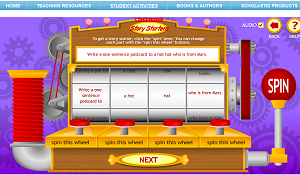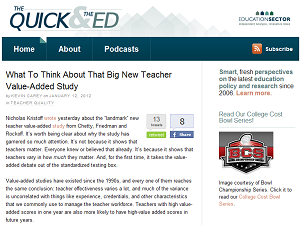 "The school is a critically important community institution, since the
quality of education shapes not only our children's individual future,
but also the future of our economy, community, and society," says Kevin
Walker. "Support of public schools is important; involvement and action
by several parents in a group can influence school policy-makers and
result in decisions and choices than can benefit many children."
"The school is a critically important community institution, since the
quality of education shapes not only our children's individual future,
but also the future of our economy, community, and society," says Kevin
Walker. "Support of public schools is important; involvement and action
by several parents in a group can influence school policy-makers and
result in decisions and choices than can benefit many children."Project Appleseed Grows Parent Involvement
On National Parental Involvement Day 2010, Kevin Walker, founder of Project Appleseed, advises schools not to lament the lack of parental involvement, but to invite parents to do more. Included: A sample parent volunteer form from Abington (Pennsylvania) Junior High.
Walker serves as the president and national director of Project Appleseed, the organization he founded as a nonprofit resource and advocate for families engaged in education. National Parental Involvement Day, held on the third Thursday of each November, was started by Project Appleseed in 1994. Walker suggests that one of the most important activities schools can employ in observance of the special day this year is to celebrate reading as a fun, school- and community-wide activity.
"Recruit parents, families, churches, and local businesses to participate in a special reading program for students and families," he advises. "Hold storytelling nights, guest author and poetry readings, read-aloud programs, dramatic readings, book fairs and book drives, a read-a-thon or a book report festival, family literacy nights, or other literacy activities for the whole community."
One of Project Appleseed's primary tools is the Parental Involvement Pledge, which asks parents to take responsibility for the education of their children through a commitment to help with homework and volunteer at school for at least five hours per semester. Some schools use the occasion of National Parental Involvement Day to introduce the pledge to parents and to rally volunteers.
|
Walker reports that there are more than 55 million public school parents in America, and he firmly believes that real education reform cannot take place without an effective parent constituency. If Americans do not make systematic efforts to address how to get parents back into the schools, he warns, they will likely face an uphill battle with some very unpleasant long-term consequences for the country.
"Many schools simply fail to ask parents to become partners in the education of students," Walker told Education World. "Schools fail to set expectations for meaningful and measurable parental involvement. They treat parental involvement as an afterthought. Principals and teachers should ask parents on the first day of school to commit to a minimum number of volunteer hours inside and outside school."
PURPOSEFUL PLEDGE
"Traditionally, across the country, there is a significant drop from the number of parent volunteers at the elementary level to the number of parent volunteers at the junior-high/middle-school level," Nicole Cicci Kazarian observes. "Parents are somewhat reluctant to volunteer at the junior-high level, but not at Abington Junior High School. Since the introduction of Project Appleseed, the commitment of families at the junior-high level has been remarkable."Prior to Project Appleseed, parental involvement at Abington Junior High School in Pennsylvania was typical for a large, suburban junior-high school and was limited to active PTO members. Parents wanted to volunteer, but the role of parent involvement was not defined. Project Appleseed brought greater clarity to volunteer activities and became a vehicle for organizing volunteer opportunities. Today, team members at the school aren't shy about asking parents to be a force in their children's education.








 Design:
The machine’s whimsical appearance and audio (think a casino slot
machine if it were designed by Willy Wonka) skew younger, but older
students are likely to find it amusing as well.
Design:
The machine’s whimsical appearance and audio (think a casino slot
machine if it were designed by Willy Wonka) skew younger, but older
students are likely to find it amusing as well. Design:
This site scores points for its simple—even spartan—design. The
homepage features a nice, dominating graphic and several clickable boxes
that direct teachers, students and other users to their respective
areas of the site.
Design:
This site scores points for its simple—even spartan—design. The
homepage features a nice, dominating graphic and several clickable boxes
that direct teachers, students and other users to their respective
areas of the site. ents
across the country—in a continued effort to shine a spotlight on the
challenges, potential solutions and innovations spanning today's
education landscape. In 2012, Education Nation will attempt to deepen
public engagement in a solutions-focused discussion on improving student
achievement and preparedness for the workforce— giving special
attention to innovation and technology.
ents
across the country—in a continued effort to shine a spotlight on the
challenges, potential solutions and innovations spanning today's
education landscape. In 2012, Education Nation will attempt to deepen
public engagement in a solutions-focused discussion on improving student
achievement and preparedness for the workforce— giving special
attention to innovation and technology. Wakefield as well as numerous poems. He is also thought to be the source of the phrase “goody two-shoes.”
Wakefield as well as numerous poems. He is also thought to be the source of the phrase “goody two-shoes.” Homeroom: This is the official blog of the U.S. Department of Education.
Homeroom: This is the official blog of the U.S. Department of Education. Edited by Wake Forest University Professor of Sociology Joseph Soares, the book presents:
Edited by Wake Forest University Professor of Sociology Joseph Soares, the book presents: Created
by Cartoon Network and Bitstrips, the campaign gives kids a creative
and novel way to add their voice to the national discussion on bullying.
Created
by Cartoon Network and Bitstrips, the campaign gives kids a creative
and novel way to add their voice to the national discussion on bullying. “We
face great challenges now, and in the years and decades ahead when it
comes to water—including its scarcity and its purity,” said Thompson.
“It is important that we have these kinds of discussions about how we
can work together to protect and conserve one of our world’s most
important resources.”
“We
face great challenges now, and in the years and decades ahead when it
comes to water—including its scarcity and its purity,” said Thompson.
“It is important that we have these kinds of discussions about how we
can work together to protect and conserve one of our world’s most
important resources.”

 An
even bigger challenge than students who are entering the school’s
lowest grade level are young people who have transferred into the
district, possibly once the school year is already underway. It can be
difficult for transfer students to not only leave friends behind at
another school, but also to be surrounded by new classmates who already
know each other.
An
even bigger challenge than students who are entering the school’s
lowest grade level are young people who have transferred into the
district, possibly once the school year is already underway. It can be
difficult for transfer students to not only leave friends behind at
another school, but also to be surrounded by new classmates who already
know each other. The compliments that the majority of us are accustomed to blurting out
when a child does something notable are precisely the type of
compliments that can have unintended negative side effects. Studies
suggest that complimenting children in this way can lead to a mindset
that intelligence and certain admirable qualities are innate, or fixed
(i.e., kids either have them or they don’t). One study
demonstrated that kids who performed well on an easy test and were
told, “You must be smart at this,” subsequently chose an easier test
when given an option of two more tests to complete. In contrast, 90% of
the students praised for effort voluntarily chose the more difficult
test.
The compliments that the majority of us are accustomed to blurting out
when a child does something notable are precisely the type of
compliments that can have unintended negative side effects. Studies
suggest that complimenting children in this way can lead to a mindset
that intelligence and certain admirable qualities are innate, or fixed
(i.e., kids either have them or they don’t). One study
demonstrated that kids who performed well on an easy test and were
told, “You must be smart at this,” subsequently chose an easier test
when given an option of two more tests to complete. In contrast, 90% of
the students praised for effort voluntarily chose the more difficult
test. different, I-messages are really just You-messages in disguise, connecting my feelings with your behavior. They may start with (or include) the word I,
but the statements carry the same energetic impact as messages of
blame, ones which blatantly state, “You (or your behaviors) make me
feel…” As such, I-messages simply give us new language for manipulation,
blaming, and projecting. Even worse, they become a tool for
self-victimization, as they present us as emotionally at the mercy of
someone’s behavioral choices.
different, I-messages are really just You-messages in disguise, connecting my feelings with your behavior. They may start with (or include) the word I,
but the statements carry the same energetic impact as messages of
blame, ones which blatantly state, “You (or your behaviors) make me
feel…” As such, I-messages simply give us new language for manipulation,
blaming, and projecting. Even worse, they become a tool for
self-victimization, as they present us as emotionally at the mercy of
someone’s behavioral choices.
 In
addition to being positive, boundaries support win-win power dynamics
because they are themselves win-win. Even the most reasonable rules are
oriented to the power needs of the adult, providing information for the
students how not to “lose.” Rarely do rules communicate how students can
“win” in any other, more positive way. Boundaries, on the other hand,
take into consideration to the desires and needs of the students they
attempt to motivate.
In
addition to being positive, boundaries support win-win power dynamics
because they are themselves win-win. Even the most reasonable rules are
oriented to the power needs of the adult, providing information for the
students how not to “lose.” Rarely do rules communicate how students can
“win” in any other, more positive way. Boundaries, on the other hand,
take into consideration to the desires and needs of the students they
attempt to motivate.